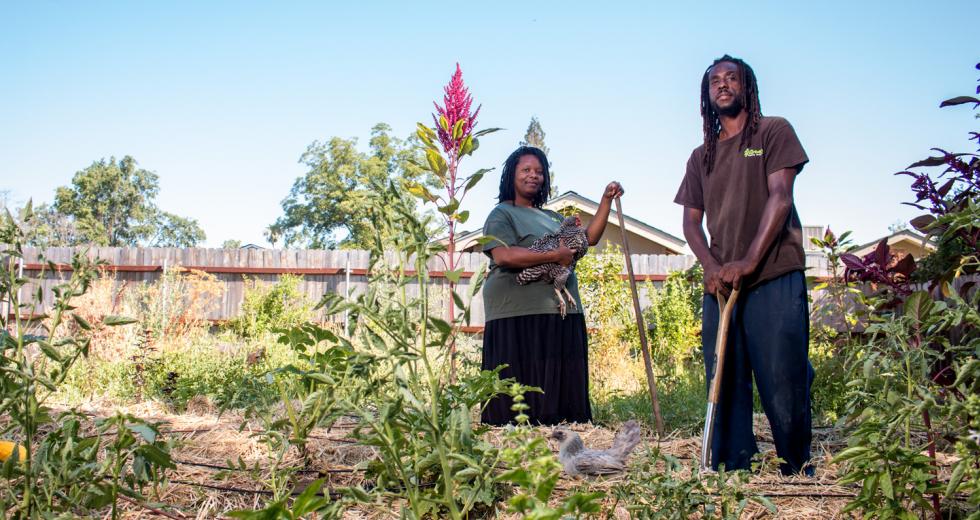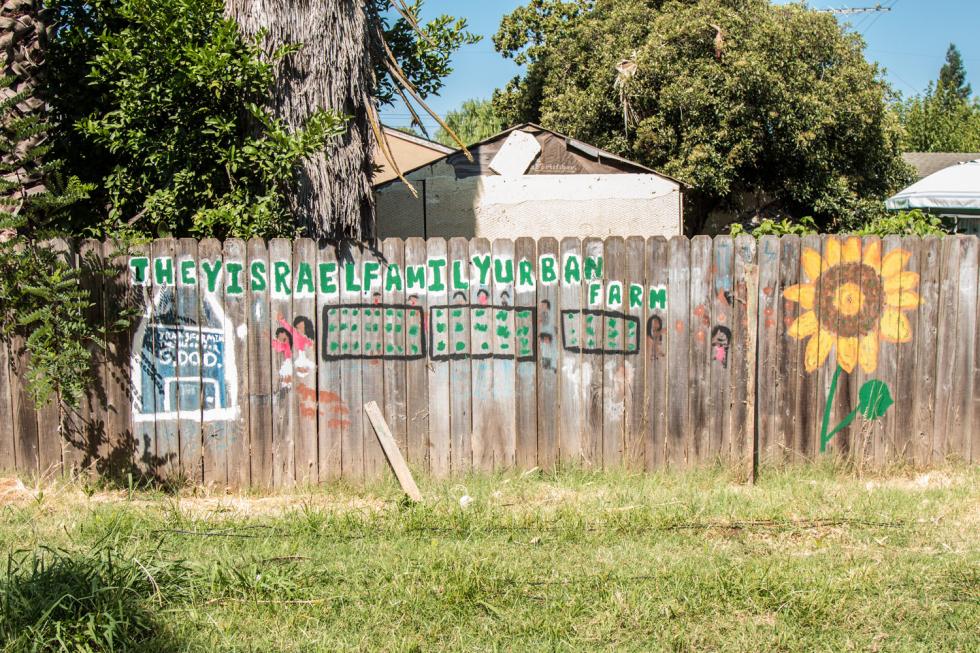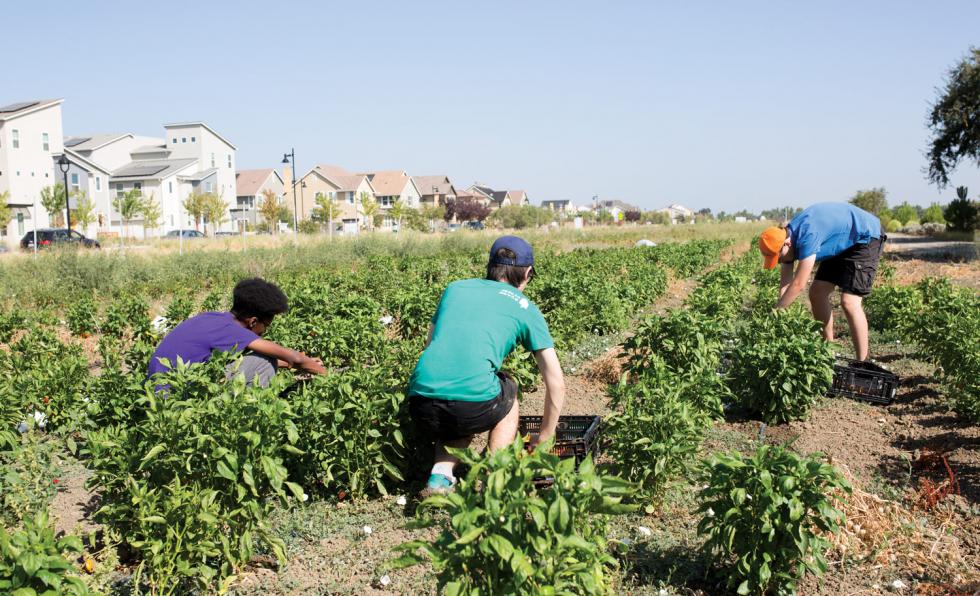Chanowk Yisrael always seems to move at full-speed. Whether he’s pulling kale out of the ground, sticking a thermometer into a compost pile, shouting out instructions to volunteers or grabbing an interested visitor for an impromptu tour of Yisrael Family Urban Farm. His property includes two adjacent residential parcels in unincorporated Sacramento County’s South Oak Park, a poor neighborhood with modest houses and chain-link fences.
On a sweltering May afternoon, Yisrael catches two teenage boys struggling to hand-pick fruit hanging high above their reach. “You guys grabbing yourself some cherries, huh?” Yisrael calls out, as he rushes past them. “Grab yourself something to snatch those cherries down!”
There must be a fruit picker laying around. But before Yisrael can find them one, he’s onto the next task of preparing his farm stand to open later that afternoon. Volunteers like these teenagers often help at the farm in exchange for free produce to take home.
To the purists, Yisrael represents what an urban farmer should be: a city-dweller as tied to the land as any rural farmer, committed to providing access to healthy foods at an affordable price, to people in his own marginalized neighborhood.
Roughly 10 years into the movement, urban farming in the Sacramento region has garnered widespread support in large part for its promises to promote healthier eating habits, alleviate food deserts and reconnect urbanites to their food sources. These farms can help remove blight, make neighborhoods safer and empower a new generation of growers via schoolyard gardens.
But in that time, hard-fought wins with local governments that lifted regulatory obstacles aren’t necessarily translating into more farms within cities. Meanwhile, activists have found a new friend — or perhaps frenemy — in the form of private residential developers who have embraced farms in their planned communities and ushered urban farming into the mainstream market.
In The Early Days
If asked, Yisrael might tell you he’s “as old as the sun, moon and stars,” jokes his wife, Judith. But in mortal years, he is 42. He has long dreadlocks and a lean, muscled frame. He is philosophical and thoughtful, yet impressively energetic — a brief encounter wouldn’t suggest that he toils outside all day and is father to a blended family of nine children.
In 2007, the couple’s farm was still just a homestead: 3,500 square feet and five fruit trees, where Yisrael grew food solely for his family. A cancer scare with both his parents had convinced him and Judith that they needed to focus on healthy eating to ward off disease. A decade ago, throughout much of the region, people weren’t allowed to keep backyard chickens or beehives, or sell food gleaned from their own gardens at residential farm stands. But a lot has changed since then.
That same year, the nonprofit Soil Born Farms upgraded from the 1.5-acre plot in the Arden-Arcade area it had founded in 2000 to an additional 55-acre location along the American River in Rancho Cordova — truly launching the region’s urban farming movement, which also built upon what many Hmong and Mien residents had been doing for years, by growing strawberries on small urban plots and selling them at informal farm stands and along sidewalks throughout the area.
Now, Soil Born grows certified-organic fruits and vegetables on 15 acres, which they sell to local restaurants, grocery stores, farmers markets, at a farm stand and through a community-supported agriculture program. They also have hogs, sheep and chickens, who have jobs in weed control, soil fertility or as a teaching tool for visitors. The public visits the farm for volunteering, yoga classes, educational workshops and special events, like the annual Day on the Farm festival that attracts nearly 2,000 people and the Autumn Equinox Celebration fundraiser for 1,000 attendees.
The organization’s 17 staff members are assisted by about 800 volunteers who help out both on the farm and off it, primarily through the Harvest Sacramento program, in which people harvest surplus fruits and vegetables around their neighborhoods to donate to food banks. Soil Born also oversees a number of school gardens in local food deserts. The original 1.5-acre plot now serves as the training ground for second-year farmer apprentices.
In 2012, Yisrael also doubled down on the movement, growing his 3,500 square feet and five fruit trees to 11,200 square feet (about one-fourth of an acre) and 40 fruit trees, with vegetable rows, compost piles, mushroom patches and chickens. He grows from seed, practices either no- or low-till, and doesn’t apply synthetic pesticides or herbicides. He and Judith also manage a 9,500-square-foot garden across the street at Fruit Ridge Community Collaborative (a shuttered elementary school now a hub of nonprofit offices).
The couple’s business model is built on a few main revenue sources: selling produce and handmade bath products like soaps, managing the Fruit Ridge plot, and teaching others how to garden for themselves. While they occasionally pay for short-term contract work, they have no employees and often rely on the assistance of volunteers.
Related: Soil Born Builds A Pipeline
One of those volunteers might eventually be neighbor Nina Berry, who happens to stop by the Yisrael Family Urban Farm right before its first farm stand opens to the public on a May evening. “You come here before the farm stand is set up and we put you to work,” Yisrael jokes to the woman.
“I always say I will come out here to work, but I never have a chance,” she responds.
“We’ll put you to work,” Judith chimes in, smiling. “Give her a shovel.” Instead, Yisrael whisks Berry away to give her a tour of the property.
Berry, who learned of the Yisraels’ farm on Facebook, is interested in learning how to grow her own produce. “I’m a container gardener and I follow how they’re doing their things, and I’m like, I got to get out here,” she says.
“You can’t walk by this place and not take note. I think it’s a completely different landscape than most of the people in this community see.” Judith Yisrael, Yisrael Family Urban Farm
Yisrael shows her his front yard, which used to be lawn, but now has herbs, vegetable plants and fruit trees. “That’s pretty cool. You can use every spot,” Berry says, before turning to examine the cherries, eggs and leafy greens on the farm stand table, along with handmade soaps and herbal bath salts, and declares she “came for the kale.”
“We got kale — three different types of kale,” Yisrael says, selling her a bunch for $2. Berry grabs a schedule of upcoming workshops and departs.
Yisrael attracts potential students, customers and volunteers like Berry through the visible uniqueness of his homestead: Neighbors passing by often pause to look at the front yard, drawn in by the fruit orchards, vegetable plants and the man tending his land. Two years ago, Yisrael got his permaculture design certificate to learn how to create a natural landscape that doesn’t require as much maintenance and human intervention. The effect: an eye-catching agrarian jungle.
“You can’t walk by this place and not take note,” Judith says. “I think it’s a completely different landscape than most of the people in this community see.”
Removing Barriers
As Sacramento’s pioneers, Yisrael Family Urban Farm and Soil Born set the stage for a vision of urban farming that focuses on getting healthy food to those who need it most. They have also been integral in shaping policy to accommodate this vision; both are members of the Sacramento Urban Agriculture Coalition.
Founded in 2013, the coalition’s first big win occurred in March 2015 with the Sacramento City Council voting 6-1 to pass the city’s urban agriculture ordinance, which allows urban growers to sell directly to consumers at residential farm stands. The policy had overwhelming support during public comment, but since the ordinance does not require permits, the number of people taking advantage of the new rule is unknown. But it meant Yisrael was able to sell at a farm stand within city limits on another parcel near Broadway owned by his family.
Photo Gallery: Life on Sacramento’s Urban Farms
Then, this past February, Sacramento County’s new urban agriculture ordinance — passed unanimously by the Board of Supervisors — went into effect, allowing urban farmers to grow and sell food from their properties. The ordinance also allows people to raise egg-laying birds and honey bees. Two applications for a permit to operate a farm stand have since been received and approved; Yisrael holds one of them.
That means he’s finally able to legally sell produce in South Oak Park’s food desert, and this summer he launched his inaugural farm stand at his home, which ran regularly May through July. For many small farmers, selling off-site presents a challenge; they must pack up their produce and equipment and drive to farmers markets — sometimes in other cities and towns — when the potential for customers could be neighbors right down the road.
While the Yisraels used to participate in a farmers market in south Sacramento, the goal was always to serve their immediate neighbors. Before having the farm stand outside their home, “mostly, we’ve committed acts of civil disobedience to do what was necessary to get our food into the hands of our community,” Judith says.
SUAC also worked toward the passage of the City of Sacramento’s Urban Agriculture Incentive Zone, which offers tax incentives for landowners to allow their properties to become farms (no more than 3-acres in size). The land must be blighted, unimproved or vacant, and kept in active agricultural use for five years in exchange for a property tax benefit. The incentive program began accepting applications in August 2016 and currently has only two participants — undoubtedly much lower than expected. More recently, in August 2017, SUAC successfully helped extend the incentive zone to cover unincorporated Sacramento county properties, not just city limits.
Related: Priscilla Enriquez on Sacramento’s Food System
But these policies didn’t “think as big” as advocates would have liked, says Paul Towers, secretary of the Sacramento Food Policy Council, who has been involved with the urban farm movement since the early days. “It’s hard enough to grow food versus figuring out how to sell at a farm stand.”
“There are a handful of people who have made it work. Beyond those handful of folks, the barriers to entry are still too great, so we have to find ways to remove those barriers.”Paul Towers, secretary, Sacramento Food Policy Council
So additionally, advocates want the City’s ordinance to remove restrictions around when people can sell produce at their residences — currently only Tuesdays and Saturdays from 8 a.m. to 7 p.m. They want farmers allowed to sell whenever is convenient for them and when doing so makes the most business sense.
SUAC also recently began co-hosting workshops in marginalized communities on how to operate an urban farm, says Jackie Cole, who joined the group earlier this year. “We want to encourage entrepreneurship,” she says. “We want to encourage people to use their backyards in some of these underserved neighborhoods … This is something they can do from their home.” The first workshop in July, held at Yisrael’s farm, had 14 participants. More workshops are scheduled through September.
Because the unavoidable fact remains that farming — anywhere — is hard. “There are a handful of people who have made it work,” Towers says, meaning that only a few urban farmers, including Yisrael, have actually been able to run a successful business. “Beyond those handful of folks, the barriers to entry are still too great, so we have to find ways to remove those barriers.”
Barriers since the beginning — lack of access to land, water and market — remain for those aspiring to become growers in Sacramento. While incentives make it more attractive for private landowners to allow their vacant lots to become farms, they often don’t want the expense of adding water hookups, which cost thousands of dollars. Or a landowner doesn’t want to commit their land to something as long-term as a fruit orchard, which takes years to produce its first crop.
Much of the current hype around urban farming is happening west of the Sacramento River. The City of West Sacramento is “hugely invested,” doing things like buying topsoil and stepping in when water connections proved too costly, says Sri Sethuratnam, director of the California Farm Academy, operated by the Center for Land-Based Learning in Winters. “In the initial development stages [of an urban farm], that support is really critical.” West Sacramento also amended its zoning code to allow for commercial crop production in residential, commercial, industrial and other areas.
Enter Agrihoods
An estimated 200 agrihoods — residential communities built with a working farm as a focus — exist across the U.S., according to the Urban Land Institute. A 2016 report on the intersection of food and real estate by ULI notes that the real estate industry is more often incorporating food halls, grocery stores, working farms, community gardens and restaurants into their development projects, as these amenities add value at little cost.
Whereas once a golf course and clubhouse might be the centerpiece of a subdivision, over the past decade, there’s been a big push for farms and community gardens, according to a recent report by the nonprofit National Center for Appropriate Technology.
The Cannery is a new 547-home, 100-acre development in Davis that includes an adjacent 3-acre farm. Produce grown here is sold to the public at a weekly onsite farm stand and through a veggie box subscription. The Mill at Broadway in Sacramento is a planned 825-home development with a 2.5-acre farm where residents can grow fruits and vegetables to consume themselves, and with a production farm with produce to be harvested for sale at the Mill Market. The Creamery at Alkali Flat, a 122-home development in Sacramento, will offer homeowners about a half-acre of urban gardens and planter boxes — more of a community garden than a farm, but a food-centered development that no doubt benefits from an increased attention toward land connectedness.
The Sacramento Region Food System Action Plan reported that our region’s agricultural abundance doesn’t translate to low levels of hunger and food insecurity. About 240,000 Sacramento County residents (or 16 percent) are food insecure.
These developments are capitalizing on consumer demand among the foodie generation. A 2015 ULI study found that 73 percent of U.S. residents consider access to fresh, healthy foods a priority. The 2016 report finds that 35 percent of all households grow produce at home or in community gardens.
But some local advocates worry that agrihoods represent the co-opting of a movement borne out of socioeconomic justice. Cannery homes are priced between the high-$400,000s up to $1 million, and the units (with names like “Heirloom” and “Persimmon”) have been selling quickly. The development sits about a half-mile from a Nugget Market — these residents aren’t exactly lacking access to healthy produce.
“We have to be careful to not make a farm too pretty and hobby-like,” Towers says of The Cannery. “Agriculture is not just a hobby and people need to make a living from it. But it is a good model … for people making connections to their food.”
Cole says these development projects miss the mark. For example, they are “clearly for an audience who can hit up a Whole Foods to pay for pre-packaged, pre-peeled oranges, should the mood strike them,” she says. “They have the luxury of enjoying fresh produce pretty much at-will. They don’t actually need urban farms, but it’s cool if you have one. And that’s great for them. I mean it. That’s actually pretty great. However, the current paradigm we live in ignores the communities in the region that have never had access to truly fresh produce.”
Amber Stott, executive director of the nonprofit Food Literacy Center (and regular Comstock’s columnist), which teaches low-income children about cooking and nutrition, says this mainstream acceptance shows that urban farming is continuing to gain traction, consumers want these spaces and the market is responding. This gets more people in positions of authority — who may not have cared before — to pay attention. That may be what’s needed if this region is to truly tackle food insecurity.
“It really is critical to have all these stakeholders at the table,” Stott says. These may be city officials with the power to change ordinances, and corporate leaders with the money to donate to nonprofit food-related organizations.
The movement benefits from everyone being involved, because improving the food system, Stott says, “is a century-long movement, and we’re just at the beginning of it.”
Teach Someone to Farm
As Stott will attest, education is one key piece to changing the food system and has long been central to the urban farming movement. The Yisraels regularly hold workshops on topics such as composting 101, backyard chickens and building soil over time. Soil Born has an education program that incorporates classes for adults, summer camps for children, a school garden program that includes 10 campuses located throughout south Sacramento and Rancho Cordova (see sidebar on pg. 51) and a symposium for teachers and others who want to someday see a garden in every school.
In 2016, Soil Born partnered with the California Farm Academy to launch a comprehensive apprenticeship program for aspiring farm and ranch managers, or those looking to start their own business. Soil Born already had an apprenticeship program, but this one dovetails off the substantial work of CFA to educate and train beginning farmers; apprentices must first graduate from the 7-month academy before they can be placed at Soil Born’s farms for ongoing, hands-on experience.
The academy incorporates all types of farmers — those who plan to grow on 3,000 acres in the countryside and those who only want one acre in a city. Another partnership between the Center for Land-Based Learning and the City of West Sacramento for an urban farm program has provided academy graduates the opportunity to work on smaller plots, close to markets and on a part-time basis to supplement a day job or on their way to becoming a full-time farmer. CLBL leases the land — vacant, underutilized lots — and then provides it at an affordable rate to the farmers.
The existence of urban farms — small and more financially-manageable plots that don’t require access to large tracts of rural land — and now agrihoods may allow for educational programs to translate into businesses and entrepreneurship. Take for instance, the partnership between the academy and The Cannery, where two graduates operate the Cannery Urban Farm. The New Home Company deeded the farmland (the former site of a tomato cannery) to the City of Davis, which then leases it to CLBL.
After 10 years of the work I’ve been doing, what I’ve realized is we have to impact people in their natural environment. We have to impact people at their home.” Chanowk Yisrael, Yisrael Family Urban Farm
The Cannery agrihood might be the first model in the U.S. that incorporates beginning farmers, says Mary Kimball, executive director of the Center for Land-Based Learning. “It’s definitely very unique,” she says, noting how the arrangement reflects a partnership among a private developer, city government, a nonprofit organization and entrepreneural farmers.
The Dawn of a New Decade
In 2015, the Sacramento Region Community Foundation enlisted Valley Vision to create the “Sacramento Region Food System Action Plan,” which reported that our region’s agricultural abundance doesn’t translate to low levels of hunger and food insecurity. About 240,000 Sacramento County residents (or 16 percent) were food insecure, according to data from Feeding America.
The plan involved representatives from various municipalities, industries and nonprofit organizations, and established four goals: improve the ag economy at all scales through better financing and more affordable land; increase the amount of locally-grown food distributed within the region instead of exported out; develop access to healthy food in underserved neighborhoods; and spread nutrition education. Urban farming can, and has, played a role in each of these goals. In fact, Shawn Harrison — cofounder of Soil Born — serves on the Valley Vision board and participated in the creation of the action plan.
The plan is meant to “offer all players in the regional food system a roadmap as to how to focus their energies,” and the foundation will periodically update the community on related initiatives, says Chief Giving Officer Priscilla Enriquez.
Meanwhile, the nexus of Soil Born’s work remains their 55-acre farm. Over one week in July, 17 children participate in a summer day camp — popular camps that typically book up months in advance, says Youth Education Coordinator Alyssa Kassner. During one morning, the kids dig out potatoes.
“We got to harvest them, but so many other hands and bodies and kids were involved in the growing and tending of these plants and potatoes,” Kassner tells the children. “We’re so lucky we got to pull them out of the soil.”
Not far from here, about a dozen Soil Born volunteers spend their weekday morning tending to tasks, like maintaining the herb and flower gardens, and helping with cooking demonstrations and food preservation. The parking lot is nearly full, and the farm is abuzz with activity. Soil Born has no doubt been the main player responsible for the excitement around urban farming over the past decade throughout the Sacramento region — along with Yisrael Family Urban Farm, once they joined the movement a few years later.
Yisrael says this summer’s inaugural farm stand at his homestead went all right, but they had to scale back the frequency to devote more attention to their youth mentorship program, Project GOOD, which stands for Growing Our Own Destiny. “I’m at the point where I want to focus on education because that’s such a big void,” Yisrael says.
During the course of 50 hours from June to August, the Yisraels taught 12 youth participants about gardening, healthy eating and how to develop community. The kids ate only a plant-based diet for their lunches. “For the most part, everyone liked it,” Yisrael says. “Some were, ‘Nah, I won’t eat that.’” Most of the work was done at their farm and across the street at Fruit Ridge Community Collaborative — although a small group also traveled to Denver in July for Slow Food Nations, a festival-conference on local food, where Yisrael served on a panel.
Youth were accepted into Project GOOD through an application and interview process, and had to attend an orientation. “We want them to take what we do very seriously,” Judith says. The Sacramento Building Healthy Communities initiative — of the California Endowment — grant-funded the program, but the Yisraels raised more money through crowdfunding to cover the costs of all children who fulfilled the application process, Judith says. “We didn’t turn anyone away.”
For Yisrael, he’s now questioning how much energy he should continue to devote to farming and selling his produce versus education. “After 10 years of the work I’ve been doing, what I’ve realized is we have to impact people in their natural environment. We have to impact people at their home,” he says. “There’s so much education that needs to be done.”
As the Sacramento region’s urban farming movement enters its second decade, the true successes of its efforts to improve the local food system will be tested. There’s also plenty of self-reflection occurring, as community members examine how to make room for a profit-driven push for urban agriculture while not squeezing out those residents who can most benefit from these places.
“We’ve got lots of kinds of models that are expanding and growing,” Kimball says, “and we need all of them.”
Recommended For You
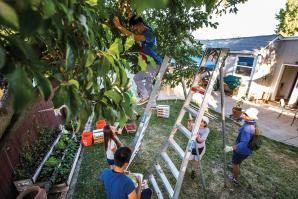
Scavenger Hunt
Unpicked produce can change the way food banks feed the hungry — you just have to know where to look
“Eat local.” You’ve heard the phrase a billion times. It’s the guiding principle of the farm-to-fork movement, nudging us away from the Industrial Food Complex and toward our neighborhood farms. But there’s something even more local than a ranch down the road: the orange tree in your front yard.
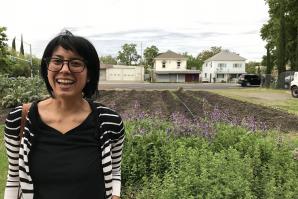
First Mother Farms Launches in West Sacramento
Graduate of California Farm Academy branches out into business ownership
For every 1 farmer over age 25, there’s 5 over age 75, according to the U.S. Department of Agriculture. America’s farmers are aging out of the business that feeds us, and Center for Land-Based Learning is focused on resolving this problem before it’s too late. To date, they have trained 96 future farmers, 17 of whom have purchased their own land and started farms.



